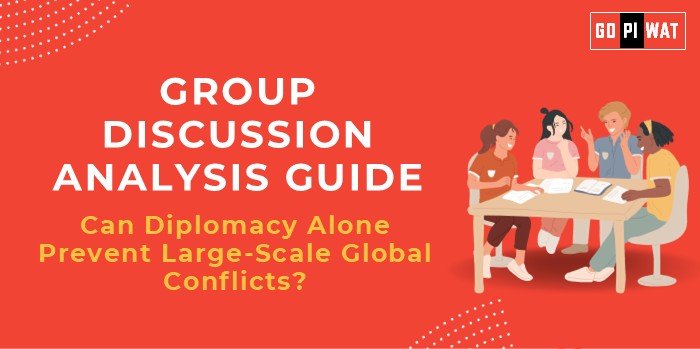📋 Group Discussion (GD) Analysis Guide
🌍 Can Diplomacy Alone Prevent Large-Scale Global Conflicts?
📝 Introduction to the Topic
🌐 Context
In a world increasingly shaped by complex geopolitical tensions and economic interdependence, diplomacy remains a cornerstone of global peacekeeping. However, its efficacy in preventing large-scale conflicts in the face of power rivalries, resource competition, and ideological clashes is a topic of considerable debate.
📜 Background
Historically, diplomacy has played a critical role in conflict resolution, from the Treaty of Versailles to modern peace agreements like the Abraham Accords. However, instances such as World War II and the ongoing Ukraine-Russia conflict demonstrate its limitations when power politics override negotiations.
📊 Quick Facts and Key Statistics
- 💵 Global Defense Spending (2023): $2.24 trillion, highlighting the prioritization of military preparedness over diplomatic solutions.
- 🌍 UN Peacekeeping Operations: 12 active missions globally, showcasing the reliance on diplomacy-backed enforcement mechanisms.
- ⚔️ Conflict-Related Deaths: Over 120,000 annually from armed conflicts, underlining the cost of diplomatic failures.
- 📑 Treaty Compliance Rate: 60% of peace treaties fail within 5 years due to weak enforcement or lack of mutual trust.
🤝 Stakeholders and Their Roles
- 🏛️ Governments: Primary actors in diplomacy, negotiating treaties, and enforcing international laws.
- 🌐 International Organizations: UN, NATO, and others mediate conflicts and implement resolutions.
- 📢 Non-State Actors: NGOs and think tanks support backchannel diplomacy and grassroots peacebuilding.
- 👥 Citizens: Public opinion often shapes national priorities, either encouraging or limiting diplomatic efforts.
🏆 Achievements and Challenges
✨ Achievements
- ✅ Successful Treaties: Iran Nuclear Deal (2015) and Paris Climate Accord (2016).
- ✅ Post-Cold War Disarmament: Reduced global nuclear arsenals by 80%.
- ✅ Regional Stability: ASEAN’s diplomatic framework significantly reduced tensions in Southeast Asia.
⚠️ Challenges
- ❌ Great Power Rivalries: Hinder collective action, as seen in UN stalemates on Ukraine.
- ❌ Rising Nationalism: Weakens traditional diplomatic mechanisms.
- ❌ Incomplete Enforcement: Makes treaty compliance difficult.
🌍 Global Comparisons
- 🇪🇺 Success: The EU has prevented conflict among member states.
- 🌍 Challenge: Instability persists in regions like the Middle East.
📖 Case Studies
- 🚩 Cuban Missile Crisis (1962): Averted nuclear war through intense bilateral diplomacy.
- ⚔️ Ukraine Conflict (2022): Highlighted limits of diplomacy in territorial sovereignty disputes.
💡 Structured Arguments for Discussion
- ✅ Supporting Stance: “Diplomacy offers the most sustainable solutions for conflict resolution by addressing root causes and fostering mutual understanding.”
- 🛑 Opposing Stance: “Diplomacy alone is insufficient; military deterrence and economic sanctions are often necessary to enforce peace.”
- ⚖️ Balanced Perspective: “While diplomacy is essential, it must be complemented by enforceable agreements, multilateral cooperation, and robust deterrence.”
🎯 Effective Discussion Approaches
- 📊 Opening Approaches:
- “With over 120,000 conflict-related deaths annually, the question is whether diplomacy alone can bear the burden of preventing global wars.”
- “The Cuban Missile Crisis is a testament to diplomacy’s power, but why has it failed in recent conflicts like Ukraine?”
- ⚡ Counter-Argument Handling:
- Emphasize successful diplomatic precedents to rebut skepticism.
- Highlight the role of enforcement mechanisms in complementing diplomacy.
🧠 Strategic Analysis of Strengths and Weaknesses
- 💪 Strengths: Encourages dialogue, reduces immediate hostilities, builds long-term trust.
- 🛠️ Weaknesses: Vulnerable to bad faith actors, slow progress, limited enforcement.
- 🌟 Opportunities: Digital diplomacy, increased multilateral engagements.
- ⚠️ Threats: Cyber warfare, growing distrust in international institutions.
🏫 Connecting with B-School Applications
📚 Real-World Applications
- Relevant to MBA courses in international business, conflict resolution, and strategy.
🎓 Sample Interview Questions
- ❓ “How can diplomacy evolve to address cyber conflicts?”
- ❓ “Discuss the interplay between economic sanctions and diplomacy.”
📘 Insights for Students
- 💡 Understand the limitations of unilateral approaches and explore frameworks for multilateral success.


